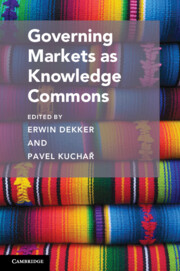Book contents
- Governing Markets as Knowledge Commons
- Cambridge Studies on Governing Knowledge Commons
- Governing Markets as Knowledge Commons
- Copyright page
- Contents
- Contributors
- Preface
- Acknowledgments
- Introduction
- 1 The Contribution Good as the Foundation of the Industrial Revolution
- 2 On the Social Evolution of Knowledge
- 3 Individual Sovereignty and Coproduction of Knowledge Governance
- 4 Common Sense Commons
- 5 Conventions as Shared Cognitive Infrastructures
- 6 Property Rights, Knowledge Commons, and Blockchain Governance
- 7 Knowledge Commons, Social Infrastructures, and Informal Markets
- 8 Entrepreneurship and Governance in the Scotch Whisky Knowledge Commons
- 9 Trolling in the Deep
- 10 Crowdfunding the Queer Museum
- 11 Understanding Different Qualities of the Knowledge Commons in Contemporary Cities
- References
4 - Common Sense Commons
The Case of Commonsensical Social Norms
Published online by Cambridge University Press: 09 December 2021
- Governing Markets as Knowledge Commons
- Cambridge Studies on Governing Knowledge Commons
- Governing Markets as Knowledge Commons
- Copyright page
- Contents
- Contributors
- Preface
- Acknowledgments
- Introduction
- 1 The Contribution Good as the Foundation of the Industrial Revolution
- 2 On the Social Evolution of Knowledge
- 3 Individual Sovereignty and Coproduction of Knowledge Governance
- 4 Common Sense Commons
- 5 Conventions as Shared Cognitive Infrastructures
- 6 Property Rights, Knowledge Commons, and Blockchain Governance
- 7 Knowledge Commons, Social Infrastructures, and Informal Markets
- 8 Entrepreneurship and Governance in the Scotch Whisky Knowledge Commons
- 9 Trolling in the Deep
- 10 Crowdfunding the Queer Museum
- 11 Understanding Different Qualities of the Knowledge Commons in Contemporary Cities
- References
Summary
Common sense is fundamental to humanity in two different but related ways. First, it is a basic capability essential to human flourishing. It helps us effectively engage with each other and our complex world. Second, it is social knowledge, often situational and contextual. Though easily taken for granted, common sense functions as critical social infrastructure that shapes and enables various social systems, including markets. This chapter examines this special type of social infrastructure, exploring common sense in general and focusing on the subset of common sense that also constitutes social norms.
- Type
- Chapter
- Information
- Governing Markets as Knowledge Commons , pp. 113 - 132Publisher: Cambridge University PressPrint publication year: 2021



